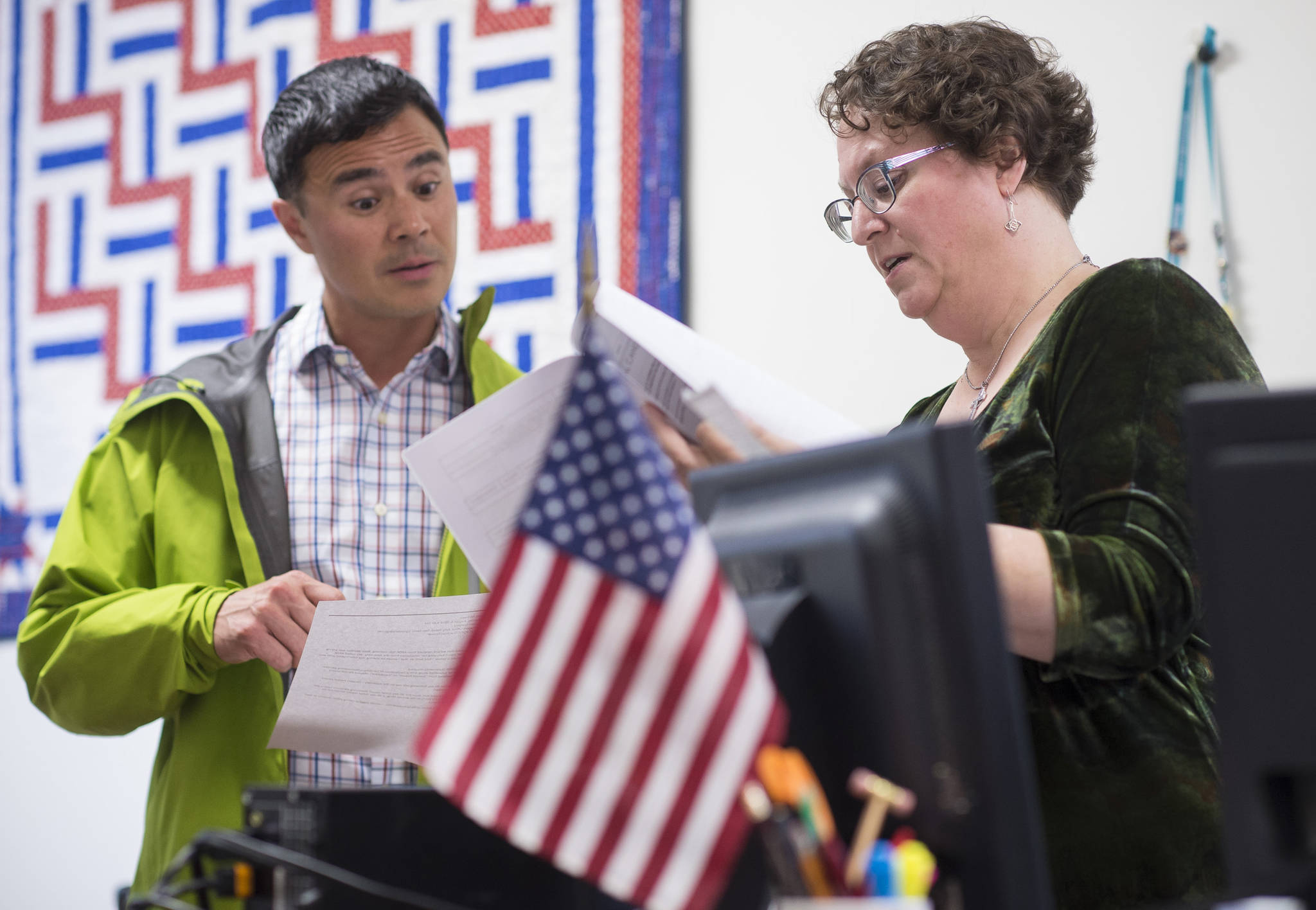All was quiet at the Clerk’s Office at City Hall on Monday, until about 3 p.m.
At that point, an hour and a half before the deadline for candidates to file to run in this fall’s election, the first domino fell. Norton Gregory filed his paperwork to run for mayor, which also signaled his resignation from the City and Borough of Juneau Assembly.
This opened up another spot in the Oct. 2 election, and in the ensuing hour and a half, three people filed to run for Norton’s vacated seat: Andy Hughes, Carole Triem and Tom Williams.
As those three filed their paperwork, additional candidates for mayor and a District 2 Assembly seat also turned in their paperwork. Cody Shoemaker filed to run for mayor, and Garrett Schoenberger filed to run for District 2.
Nobody registered for the Board of Education race on Monday, leaving three candidates — Kevin Allen, Paul Kelly and Elizabeth Siddon — for three seats. Current Assembly member Loren Jones is running unopposed for re-election in District 1.
Mayoral candidates
Gregory, 39, said he’s been thinking about running for mayor for about a year. Gregory is midway through his first term on the Assembly and works for Tlingit and Haida Regional Housing Authority during the day.
Shoemaker, 27, is a car detailer at National Enterprise at the Juneau International Airport and has never run for public office before. He said he’s been thinking about running for a while, and said he’s noticed the increase in crime and drug use in the community recently and said he wanted to help find a solution.
Shoemaker, a graduate of Juneau-Douglas High School, acknowledged that he doesn’t have the experience that other candidates might have but he wants to get involved in the public process.
“I just really feel like helping people and serving people and listening,” Shoemaker said, “and actually taking into consideration how other people feel about the community also.”
Gregory and Shoemaker make four candidates in the race. Former Assembly member Beth Weldon and Aiding Women in Abuse and Rape Emergencies (AWARE) Executive Director Saralyn Tabachnick have also registered to run.
Areawide candidates
Triem, 30, was the first to file her paperwork, arriving before Gregory resigned and having a brief exchange with him where he wished her luck. Triem, an economic development advisor for the Division of Economic Development, said she’s most interested in taking an analytical look into proposals that come to the Assembly.
Being a young member of the community who recently bought a house and is looking to put down roots in Juneau, Triem said she understands how challenging it can be to live comfortably in town.
“I think local government’s role is to support the lives of the people who live in Juneau, and that means an accessible Juneau for young families,” Triem said. “That could mean affordable housing and affordable childcare, all the way up to making it easier for seniors to live here.”
Hughes, 77, was next to file his paperwork. Hughes ran as a write-in candidate in the 2017 municipal election, and joked that he’s much more optimistic about his chances this year now that his name will be on the ballot.
Hughes, a retired regional planning chief for the Department of Transportation, has been going to numerous Assembly, Chamber of Commerce and other community meetings in recent years and said he’s concerned about the community in which he’s spent the past 45 years.
“It’s the same issues. I’m concerned about security in the community,” Hughes said. “Security includes adequate police force, adequate fire and rescue department and it includes providing sufficient resources for all the NGOs to provide their support for the mentally ill and the new entrants from the prison.”
Williams, 66, filed his paperwork just after Hughes. Williams, the financial officer for Ward Air, ran for Assembly in 1991 and finished second in a close race. His background is in accounting, having worked as a CPA for the state for 18 years, and said the Assembly members need to be more conservative with the way they commit public money.
He specifically pointed to the possibility of spending taxpayer money on the new Juneau Arts and Culture Center, which was initially supposed to be privately funded. Williams said he was concerned that the Assembly members aren’t thinking of the long-term implications of how they’re committing money.
“Common sense has to come back to the Assembly in some of these decisions,” Williams said.
One more District 2 candidate
The District 2 Assembly race was already a crowded one before Monday, and became just a bit more full. Garrett Schoenberger, a Juneau-born businessman who is one of the owners of private equity company Alaska Legacy Partners, filed his paperwork Monday to become the fifth candidate for two seats.
Schoenberger, 35, graduated from JDHS in 2000 and went off to Arizona for college. He worked in commercial real estate for a while and wanted to continue doing that work in Juneau. He and fellow JDHS alumnus Paul Simpson formed Alaska Legacy Partners and have invested in development projects in town.
Running for public office, Schoenberger said, seemed like a logical next step to try and boost Juneau’s economy.
“I figured this was a good opportunity to get more involved and make it easier to make Juneau a great place to do business,” Schoenberger said.
He’ll run against Wade Bryson, Don Habeger, Michelle Hale and current Board of Education member Emil Mackey. There are two open seats, one with a three-year term and one with a one-year term (Weldon left one year on her term when she resigned). The top vote-getter will get the full term while the second-place finisher will get the one-year term.
• Contact reporter Alex McCarthy at 523-2271 or amccarthy@juneauempire.com. Follow him on Twitter at @akmccarthy.

